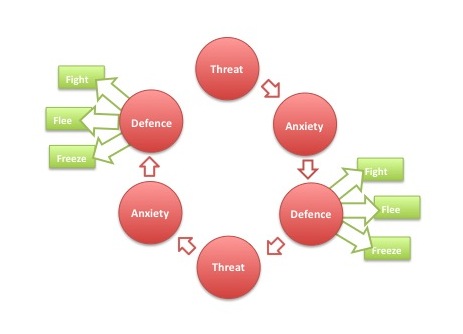One of my favourite clients is a capital equipment manufacturer with whom I’ve had a 10 year relationship – longer than many marriages (including my own). I celebrate their successes in the background and mourn their losses. I have an attachment to them that is a bit like family – a dysfunctional family, but family nevertheless. The management team in this beloved client is facing some challenges that are the result of an unhappy period that has damaged or destroyed some relationships and even some careers, and created enormous damage in the business. The result is that the current management team is consumed with a turnaround that should never have been necessary.
When Internal Departments Compete Against Each Other
They now have departments that should be collaborating in the interests of the success of the business. Instead, they are pitted against each other in a battle that should be reserved for its competitors. This makes the most basic problem-solving extremely difficult.
Let me begin with the premise for my approach:
1. Nobody gets up in the morning and says “What shall I do today to make everyone else’s life as difficult as possible?” We all want to do a good job and be well thought of.
2. Every problem has a solution – even if the only solution is to think about the issue in a different way.
3. If everything you’ve tried has failed, then you haven’t tried everything.
In a scenario like I have described above, you have multiple people in various parts of the business constantly feeling under threat – their competence is in question, and this is experienced as a survival threat. Let me explain:
When It Feels Like Our Survival is Under Threat We All Behave Badly
It is about survival – and in the corporate jungle only the fittest survive. In the workplace, only those people who can defend themselves against threats to their survival and demonstrate their fitness (competence) will last and increase their chances of advancement. Defensive behaviour is the same in everyone (and in all animals). When a person perceives a threat to his survival (appearing incompetent or losing his job) it creates anxiety (fear). This causes a hormonal response that shuts down the pre-frontal cortex (the thinking part of the brain). It is a physiological condition. The person then defends against the threat using a fight (get aggressive, defend themselves or blame other people), flee (withdraw and try to fly under the radar) or freeze (become paralysed and unable to take decisions or act) response. This is called the threat – anxiety – defence response. It works like a vicious cycle, because that defensive response provokes a similar response in the other parties to the conflict. When in the grips of such a response, the pre-frontal cortex (the thinking part of the brain) has shut down, and a constructive conversation is impossible.
In an environment where erstwhile collaborators are pitted against each other in an unhealthy competition, this is exactly what is going on. So what is one to do? Well, it rests on the person who understands this cycle (that would be you) to do three things. Firstly, make a conscious decision to interpret the other party’s defensive behaviour as having “nothing to do with me” – assume that something is going on for them. This will prevent you from experiencing their behaviour as a threat to you – so you will not go into the threat-anxiety-defence response yourself. Secondly, take charge of your language. Do not use words or tonality that is accusatory or provocative. Thirdly, position all conversations that are intended as collaborations as just that – clearly state that your intention is to collaborate and find a mutually satisfactory outcome.
So the first part of moving from unhealthy conflict to collaboration is to take charge of your own threat – anxiety – defence response. The second part is to use a collaborative model to prepare for and conduct the discussion. I will use the Cohen-Bradford Model of Influence Without Authority and GROW. I will continue these in Parts 2 and 3.
Contact me
If you are a leader/manager and this topic is something you would like to develop in yourself, email me at [email protected] and let's discuss your coaching programme.


 RSS Feed
RSS Feed


